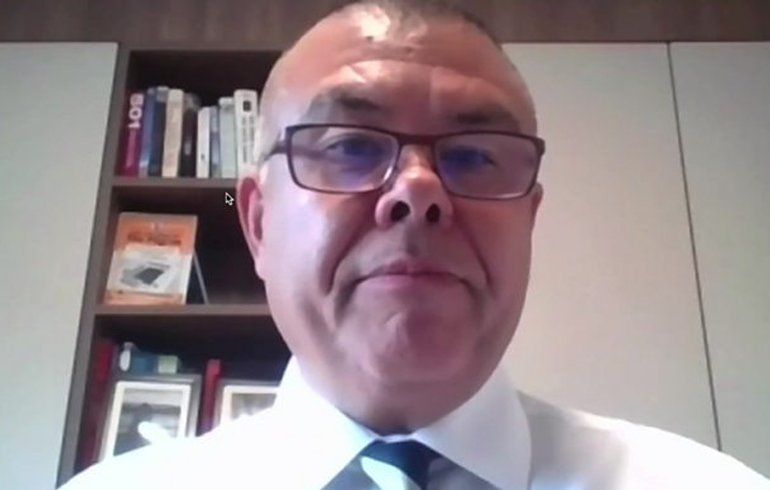The UK is entering a “period of particular concern” as the number of coronavirus cases rise across the country, the housing secretary says.
Robert Jenrick said “we all have to be very cautious” after 2,948 new UK cases were recorded on Monday.
It comes after two of the government’s scientific advisers gave stark warnings over the rise in cases.
England’s deputy chief medical officer, Prof Jonathan Van Tam, said the increase was of “great concern”.
Virus cases were “increasing exponentially”, according to another member of the Scientific Advisory Group for Emergencies (Sage), Prof John Edmunds.
The seven-day rate of new cases of Covid-19 in the UK has now risen above 20 cases per 100,000 people.
On Sunday 2,988 new cases were announced, which was the highest figure since 22 May.
At the peak of the virus in spring official figures showed there were 6,000 cases a day, although testing was largely only taking place in hospitals.
Estimates suggest there were around 100,000 cases a day at that point.
Mr Jenrick told BBC Breakfast: “The virus is still very much with us, it’s still concerning.”
He said if people followed the government’s guidance “we should be able to continue to control the virus but we’re going to have to be especially cautious as we go into the autumn and winter”.
“If we all play our own part then we should be able to maintain our daily lives in this sort of new normal but we’ve got to be very cautious because, as you’ve seen, the number of cases is rising.”
Mr Jenrick added there was a particular responsibility on younger people to follow government guidelines on Covid-19, so that infection rates would not spike again.
“We have to keep hammering the message home. Of course the people in those age categories are unlikely to become extremely unwell as a result of having the virus.
“But they are able to pass it on to others,” he said.
“There’s a responsibility on younger people to not just stay at home, obviously to go out and go to work and to enjoy pubs and restaurants, but to do so in accordance with the guidelines.”
His comments follow Health Secretary Matt Hancock’s warning that warned young people that the UK could see a second spike in coronavirus cases if young people do not follow the rules.
“Don’t kill your gran by catching coronavirus and then passing it on,” he told BBC Radio 1’s Newsbeat on Monday.
Prof Edmunds, from the London School of Hygiene and Tropical Medicine, told ITV’s Robert Peston that the R number – which rates Covid-19’s ability to spread – had risen “above one”, so the UK was in a “risky period”.
“We can see the epidemic is taking off again. So I don’t think we’ve hit that sweet spot where we’ve been able to control the epidemic and allow the economy to return to some sort of normality,” he said.
Prof Edmunds, who has previously said he wished the UK had gone into national lockdown earlier than it did, added that cases were rising from a “relatively low level” but “are increasing now exponentially”.
Earlier on Monday, Prof Van Tam described the latest change in coronavirus infections across the UK as a “great concern”, adding: “People have relaxed too much. Now is the time for us to re-engage, and to realise that this a continuing threat to us.”
Prof Van Tam added that hospital admissions and deaths were “at a very low level” in the UK and the rise in cases was most prominent among those aged between 17 and 21 – but the country risks following the trajectory of some EU countries.
“The fact that 17 to 21-year-olds are not becoming ill means they are lucky, but they also forget because the disease is not severe for them that they are potent spreaders.”
He said the UK would be in for “a bumpy ride over the next few months” if people did not adhere more stringently to social distancing rules.
Wake-up call for the public
Prof Jonathan Van Tam was known for his plain speaking at Downing Street press conferences earlier in the pandemic.
Now England’s deputy chief medical officer has once again come out with a blunt warning about the spread of the virus.
Put simply, he believes there’s been a significant and concerning change in recent days. No longer is this all about local outbreaks – instead, in his view, there is now a general spread of the disease in many parts of the country.
He suggests social distancing has broken down for some parts of society and points to rising case numbers amongst 17 to 21-year-olds.
That does not mean hospital admissions, currently relatively low, will definitely rise. But Prof Van Tam thinks that is very possible.
He implied the next week would be critical as officials and ministers studied the emerging data.
This is a wake-up call for the public to get real about social distancing, from a medical leader who is clearly worried.
The Sage scientists’ comments come as more parts of the UK are to face tougher restrictions following a rise in the number of cases.
In Wales, the county borough of Caerphilly is to be placed under a local lockdown from 18:00 BST on Tuesday.
Welsh Health Minister Vaughan Gething said there was evidence of “community transmission” in the area which had largely been caused by a failure to follow social distancing guidelines.
He told Radio 4’s Today programme: “It is that breakdown in social distancing, that breakdown in respecting the rules around extended households, that is driving infection rates.”
Stricter rules on visiting other people’s homes were also extended to two more areas in the west of Scotland from midnight.
Meanwhile, council leaders in north-east England have said the average number of new cases in the region has doubled to about 80 per day, in just over a week.
A joint statement from seven council leaders said: “We have seen cases where individuals with symptoms have had a test, then gone out and infected others before getting their results – reckless and selfish behaviour.”
The statement also warned businesses that they would be shut down if they did not record customers’ details to aid the NHS Test and Trace contact tracing programme.
“We all have to do our bit and to play our part if we are to prevent a potential second wave,” the leaders said.
The warnings come after Transport Secretary Grant Shapps announced a change in England’s quarantine policy, adopting an approach which allows islands to have separate rules from a country’s mainland.
He said travellers arriving in England from seven Greek islands will have to self-isolate for 14 days from 04:00 BST on Wednesday.
They are Crete, Lesvos, Mykonos, Santorini, Serifos, Tinos, and Zakynthos (also known as Zante).
Source: BBC

















































